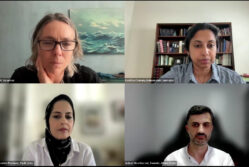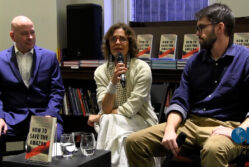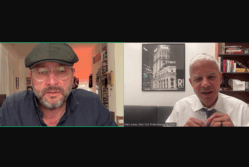Archive Event Highlight

Correspondents, Survivors and China Watchers Discuss the Legacy of Tiananmen Square
by Jonas Ekblom and contributors
Thirty years have passed since the world witnessed China’s brutal attacks against pro-democracy demonstrators in Tiananmen Square, but the country’s campaign against critics and dissidents has returned with renewed intensity, using more subtle tactics and new technology to carry out oppression. On May 9, the OPC gathered a small army of activists, survivors, experts and foreign correspondents to explore the legacy of Tiananmen, discuss the state of China’s escalating crackdown, and illuminate the road ahead for democracy advocates.
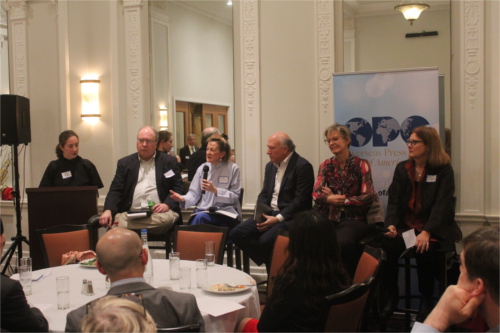
Left to right: Susan Jakes, Bruce Kennedy, Dorinda Elliott, Adi Ignatius, Carroll Bogert and Dori Jones Yang. Photo: Chad Bouchard.
At the first panel in a day-long event, five veteran correspondents who were there in 1989 said the event was groundbreaking, and at the time it seemed protests had emboldened more people to speak candidly about their concerns, clearing the way for foreign reporters to cover China.
“People were so open!” said author Dori Jones Yang, who covered the protests for BusinessWeek. “They were open about politics: what they were thinking about [Chinese leader] Deng Xiaoping.”
Caroll Bogert, then with Newsweek, agreed: “It was a torrent of talk!” She also said that there was “the feeling that China was actually speaking. Suddenly everyone would talk to you about what was happening.”
Several members of the panel had been correspondents in China for many years before the Tiananmen protests broke out. They had seen first-hand the increased unrest a stalling Chinese society had led to. “People were frustrated with the slowing of reform,” Adi Ignatius, who reported for The Wall Street Journal, observed. “There was discontent among the students and it had to come out some way.”
Ignatius also took a longer view and said that if the Chinese authorities had met what he called “moderate demands” from the protesters, “China would have taken off sooner.”

Left to right: Andrew Nathan, Wu’er Kaixi,Sheryl WuDunn, Jerome Cohen and Teng Biao. Photo: Chad Bouchard
Dorinda Elliott, who covered the events for Newsweek, also pointed to the protests’ influence on present-day China. “It was a real turning point for China,” Elliott said. “It is what has led to the distortions in today’s China.”
The moderator for the panel, Susan Jakes, editor at ChinaFile, said she was the only one on the panel who hadn’t been at Tiananmen Square in 1989, and asked the panelists to recall what reporting was like on those burning days three decades ago.
Bruce Kennedy, who covered the events for CNN and NPR, vividly remembered that “at one point there was such trauma going on. People were wounded and people were shooting.”
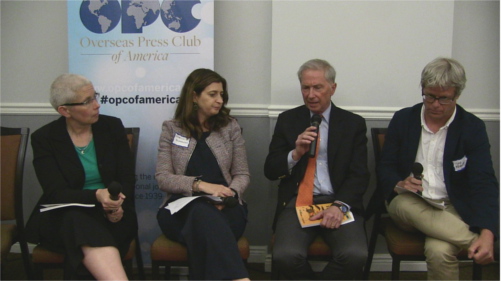
Left to right: Sophie Richardson, Bill Holstein, Christina Larson and Dexter “Tiff” Roberts. Photo: Chad Bouchard
The panelists also turned their eyes to the future and reflected on reforms the protests spurred, such as the presidential term limits that were recently scrapped by current president Xi Jinping. “One thing Deng Xiaoping hasn’t gotten enough credit for is creating term limits for the highest leaders in the land,” said Jones Yang. “I was very optimistic about the future of China until last year.”
The OPC invited three survivors from the Tiananmen Square protests to speak about their experiences during and after the protests. The panel started with a showcase of archival footage featuring all three protestors present: Wu’er Kaixi during a hunger strike, Rose Tang at the front lines of the protests, and Zhou Fengsou at a hearing.
“I was honored being China’s most-wanted person,” Wu’er Kaixi said, and laughed when he said that his student activism and hunger strike around the Tiananmen protests put him at the very top of the Chinese government’s watchlist.
Rose Tang took the opportunity to reflect on her fellow protesters that did not achieve fame or even died protesting: “There are so many nebulous people that died for nothing or were jailed for nothing,” she told the audience.
The threat of persecution is still very strong, and even outside of China, many Chinese are wary of talking about the Tiananmen Square events. Former UPI correspondent William J. Holstein, a past OPC president who moderated the panel discussion, asked participants: “Is there a global war between the government and survivors?” To which all three nodded in agreement.
“A lot of the survivors are today afraid to talk,” said Zhou Fengsuo, who himself has fallen victim to abuse from supporters of the Chinese regime. “I was beaten a few times in San Francisco,” he said, adding: “This is the situation we are facing as survivors.”
Zhou Fengsuo also praised journalism and the journalists that covered the protests. “The most important thing is press freedom,” he said.
When the panel shifted focus to current-day affairs, Kaixi expressed frustration over the non-confrontational attitude other countries have toward China’s leadership: “Why are we so over-complimenting to the Communist regime?”
Rose Tang agreed, and appealed to the audience: “Let’s not overestimate the Communist party’s power. They are afraid of ordinary people.”
There was a worry among all three panelists that the current regime could tighten their grip even more, a grip that was once loosened after the Tiananmen protests: “Before Tiananmen Square the Communist party choked China to death, after, they decided to ease their grip a bit,” Kaixi said.
For the mothers of those who died at Tiananmen, the past bleeds into present-day, particularly when they raise their voices in a country that prefers to keep them silent. In a touching tribute beteween panels, Sharon Hom, a professor at NYU Law and the executive director of Human Rights in China, unveiled the next phase of an effort to send letters from the mothers that fearture four demands: the truth about the events that transpired, full accountability for the government’s role, a formal apology, and compensation for their loss. As part of the project, the names, faces, and life stories of the deceased were posted online and incorportated into a 22-minute documentary that was released soon after the day of panels.
The project is called The Forgotten, serves as a memorial to those who have been silenced, and those who continue to speak on their behalf.
The third panel discussion of the day was moderated by author Sheryl WuDunn, who won the OPC’s 1989 Hal Boyle Award and a Pulitzer prize for her coverage of China. The spotlight focused on Chinese president Xi Jinping and on the disproportionate effect that one man can have on the billion-member society that he governs.
The panelists analyzed both the man and his methodology: what he does, how and why he does it, and the ways in which Jinping’s policies have departed from previous leaders.
Columbia professor Andrew Nathan described the overarching goals of Xi’s policies: “Imposing control over society, including those who are not with the program.”
This is nothing new, said Kaixi, who survived Tiananmen Square. “That’s how Chinese governments have been ruling China: with fear.”
Those who comply are offered social and economic advancement. “I call it ‘the lousy deal,’” he said. “Economic freedom in exchange for political freedom.”
But even there, the government maintains a type of balance. “You cannot let go of the economy because that will empower actors who are stronger than you,” Nathan said.
While that’s been the case for many decades, one critical change for the new guard, said Kaixi, is that “Xi Jinping wants to export his ideas to the world. That’s different than his predecessors.” That includes political crackdowns, censorship of the press and Internet, and the controversial social credit system that is currently under development.
Both Kaixi and Teng Biao, a former lawyer, law professor and law reformer who was kidnapped three times in China and is now living in enforced exile, strongly supports intervention. Biao said that Chinese communism “is not just a threat to Chinese people, but to the whole world. It is maybe the most important thing that all countries, all people on this planet, are facing.”
For governments and entities who decide to intervene, Jerome Cohen, a professor at NYU Law, offered an observation: “They don’t respond to world criticism, but they do respond to world pressure. What the Japanese call gaiatsu, world pressure, is important in China.”
A short afternoon session on the outlook for contemporarryh Hong Kong followed, moderated by Minky Worden, OPC governor and Human Rights Watch director of global initiatives.
Lee Cheuk Yan, secretary of the Hong Kong Alliance in Support of Democratic Movements in China, described being allowed on a plane and then detained once the authorities confirmed his name, due to his political efforts.
Martin Lee, founding chairman of Hong Kong’s Democratic Party, recounted his plan to buy a coffin with which to lead a political march, only to realize, ahead of the purchase, that the symbol could have unintended inflamatory results. When he changed the order, the person on the other end of the line said, according to Lee, “‘This is first time I’ve ever heard of anyone ordering a coffin and canceling it,’” he said, provoking laughter from the audience.
On a more serious note, he warned that Honk Kong’s proposed extradition law would threaten the safety of everyone in Hong Kong.
Mak Yin-Ting, former chair of the Hong Kong Journalists Association, offered a grounding observation: “Telling the truth is our nature, our job as a reporter. But in China, you have to fight for it.” He said that sometimes activists and journalists win the fight, allowing for the truth to escape, even when people cannot.
In the final panel of the day, the topic was how both new and long-established technologies have become tools of control for China. The conversation covered emerging technologies like artificial intelligence and smart cities, but also seemed to keep veering back to telecom giant Huawei and its major developments toward establishing 5G mobile networks both within and beyond China’s borders.
Holstein noted that those developments reflect not only differences in technological capabilities, but also larger philosophical differences in the ways that the two countries develop and roll out technology.
“China takes a long-term, 5- to10-year development cycles for transformational technologies. We don’t,” he said. The result: Though both countries are working to advance areas like AI and quantum computing, he said, the 5G rollout has been the first instance for which the U.S. doesn’t have an answer.
Moderated by Rebecca Blumenstein, Pulitzer prize winner and deputy managing editor of The New York Times, the panel included a look at the recent past. The panelists agreed that over the last decade, the U.S. tended to underestimate China’s ability to develop technologies that are used today, while Dexter “Tiff” Roberts, a Mansfield Fellow at the University of Montana, suggested that the U.S. may now be overestimating China’s ability to advance other areas, like robotics.
Each of the panelists pointed to surveillance as a key area of concern. Roberts looked at domestic affairs, citing surveillance in Xinjiang, the province in Northwest China that houses many minority populations, including the persecuted Uyghurs. Holstein looked to China’s actions abroad, citing recent security breaches at large, multi-national corporations like Equifax and Marriott as evidence of the country’s ability to acquire big data. “The question among the American data people is: What are they doing with all of these data?” he asked.
Sophie Richardson, Human Rights Watch’s director of China, took a broader view, pointing to a tendency in the media to make spurious or unfounded claims that the Chinese don’t value privacy. “Why would you logically expect people to value a right that they’ve never had?”
The day of panels and social events to commemorate the 30th anniversary of Tiananmen drew capacity crowds at Club Quarters rivaling previous “China Hands” reunions, with media outlets and documentary crews covering the discussions.


